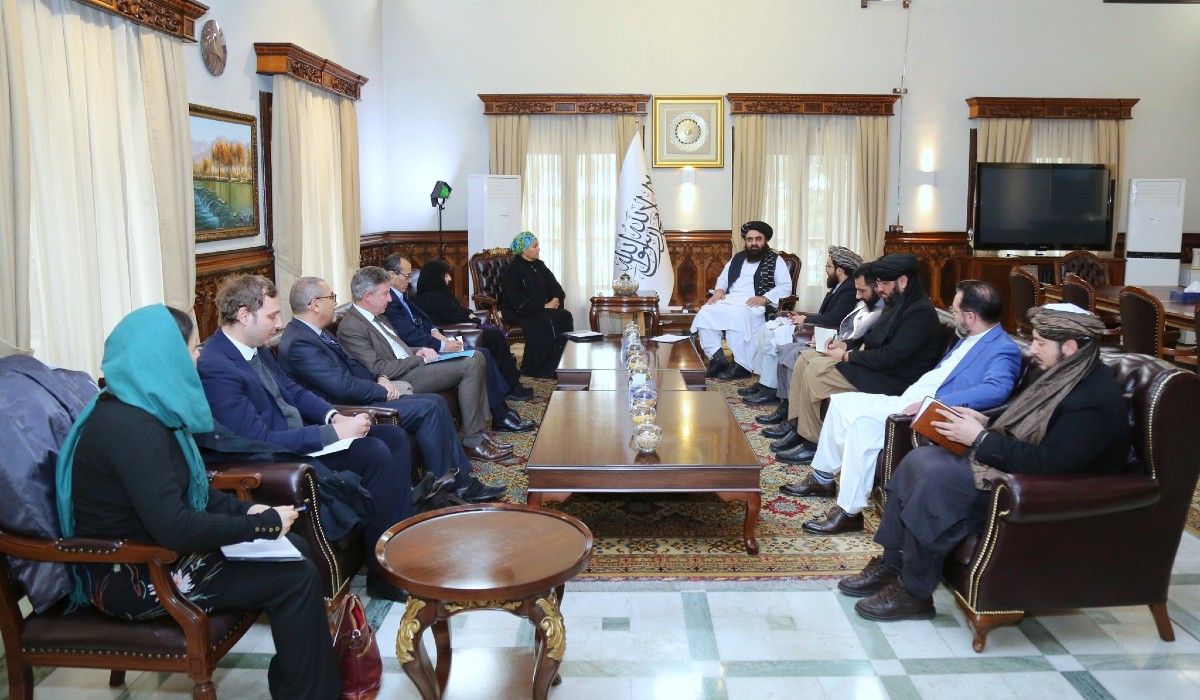Deputy Secretary-General, Amina Mohammed, the Executive Director of UN Women, Sima Bahous, and the Assistant Secretary-General for UN political, peacebuilding and peace operations, Khaled Khiari, spent four days on a fact-finding mission to Afghanistan this week where they also engaged with Taliban leaders, where they called on the group to reverse their recent course of action.
In meetings with de facto authorities in Kabul and Kandahar, “the delegation directly conveyed the alarm over the recent decree banning women from working for national and international non-governmental organizations, a move that undermines the work of numerous organizations helping millions of vulnerable Afghans.”
The latest clampdown on working women followed edicts from the fundamentalist Taliban to close universities to female students, until further notice, and prevent girls from attending secondary school.
Excluded from public life
Women and girls have also been ordered to stop using parks, gyms, public bath houses, and banned from most areas of the workforce, together with other restrictions on their freedom of movement, in line with the authorities’ interpretation of Sharia law.
The ban on local women working in the crucial aid sector came into force last month, prompting many aid agencies to suspend operations, as they were unable to reach many families in need, without the support of female staff.
In response, Taliban rulers did announce some exemptions that would allow women health workers to go about their life saving work.
All Afghans suffer due to restrictions: Mohammed
“My message was very clear”, said the UN deputy chief. “While we recognize the important exemptions made, these restrictions present Afghan women and girls with a future that confines them in their own homes, violating their rights and depriving the communities of their services”.
“Our collective ambition is for a prosperous Afghanistan that is at peace with itself and its neighbors, and on a path to sustainable development. But right now, Afghanistan is isolating itself, in the midst of a terrible humanitarian crisis and one of the most vulnerable nations on earth to climate change,” she added. “We must do everything we can to bridge this gap.”
During their mission, Mohammed and Bahous met with affected communities, humanitarian workers, civil society and other key actors, in Kabul, the Taliban heartland of Kandahar, and Herat.
‘Extraordinary resilience’: Bahous
“We have witnessed extraordinary resilience. Afghan women left us no doubt of their courage and refusal to be erased from public life. They will continue to advocate and fight for their rights, and we are duty bound to support them in doing so,” UN Women’s top executive Bahous said.
“What is happening in Afghanistan is a grave women’s rights crisis and a wakeup call for the international community.
“It shows how quickly decades of progress on women’s rights can be reversed in a matter of days. UN Women stands with all Afghan women and girls and will continue to amplify their voices to regain all their rights.”
UN commitment
The United Nations and its partners, including national and international non-governmental organizations, are helping more than 25 million Afghans who depend on humanitarian aid to survive, and remain committed to staying and delivering, the UN said in a statement.
“While the recent exemptions to the ban introduced by the de facto authorities are opening spaces for humanitarians to continue – and in some cases resume – operations, these remain limited to few sectors and activities”, read the UN statement, which was issued on Friday.
Throughout the visits, the UN’s crucial role as a bridge builder towards “finding lasting solutions” was emphasized, “as well as the urgency to deliver lifesaving support and maintain effective engagement, led by the United Nations Assistance Mission in Afghanistan (UNAMA).”
The top UN delegation called for efforts to be intensified to reflect the urgency of the crisis facing Afghan women and girls, “and stressed the importance of a unified response by the international community.”
The UN reported that a proposal to hold an international conference on women and girls in the Muslim World, during March this year, “was also considered and agreed in principle.”





